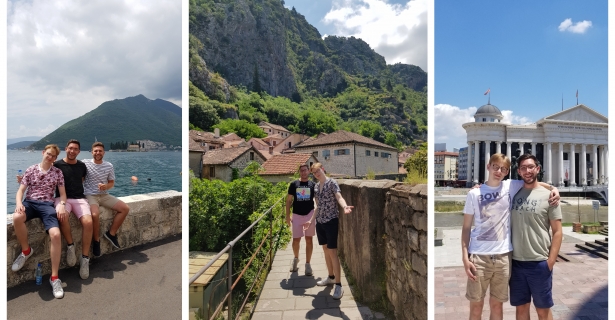After spending the past month and a half in Belgrade, I am still enthralled with the incredible work CANVAS is doing and find myself charmed by Belgrade more and more every day. The projects I have been working on have cemented my belief in nonviolence and “people-power,” and I feel that I am learning the intricacies of the groundwork and planning that goes into starting nonviolent movements and campaigns.
A very formative experience in the past few weeks has been a visit by Bulgarian activists to our office in Belgrade. Four activists from a group called “Okolobulgarsko,” which means “Around Bulgaria,” came to CANVAS to benefit from Srdja Popovic’s expertise so they can find ways to strengthen and expand their movement. These activists started by traveling around Bulgaria to talk to ordinary people about their problems in order to lay the groundwork for a larger movement that hopes to increase the capacity for change in Bulgaria. While Bulgaria may not be ruled by a dictator, like many of the other countries CANVAS works in, the current political and economic situation is dismal in large part due to widespread kleptocracy. These activists want to empower and grow Bulgarian civil society, so they came for the resources and skills needed to fight against the kleptocracy.
While I have had discussions with Srjda about how CANVAS works with movements, this was the first time I saw these concepts being put into action. Srjda shared insights into how these activists can tangibly start a movement (including tactics on mobilizing different sectors of society, methods of solidarity and protest, and the importance and specifics of planning), and the other interns and I helped brainstorm long-term strategies and goals. I will be supporting their movement for the rest of my time in Belgrade and will hopefully be able to assist them in laying the groundwork for a successful campaign.
I am continuing to work on my situational analyses for the ten Freedom Fellow activists who are coming to Belgrade in about three weeks for a week-long training session. Learning about and researching the pro-democracy movement in Hong-Kong, the lack of situational improvement in the realm of human rights in Eritrea even after a monumental peace deal with Ethiopia was signed, as well as the fractured state of democracy in Thailand has all strengthened my belief that “people-power” is essential for solving the crises these countries face.
I have also been fortunate to travel to two more former Yugoslav countries to expand my understanding of the Balkans and life in the region. My trip to Sarajevo, Bosnia and Herzegovina was transformative as I had wanted to visit the country ever since learning about the Bosnian War in a class at Tufts. Sarajevo was completely destroyed during the war and was besieged by Bosnian-Serb forces for 1,425 days, which remains the longest siege of a capital city in the history of modern warfare. Much of the devastation remains, and what I found was a beautifully vibrant city still recovering 24 years after the war ended. Seeing hundreds of shelled buildings and the “Red Roses” (a memorial made from concrete holes in the ground caused by a mortar shell's explosion filled with red resin) was jarring and highlighted the scope of the destruction. I also visited two different museums about the Srebrenica genocide, which has been described as the worst crime on European soil since World War II. These museums were harrowing, intense, and helped me better understand the extent of the collective pain of the Bosnian people. My trip to Sarajevo left an imprint that deepened my commitment to preventing war and genocide through peace and nonviolence.
I also visited Skopje in the Republic of North Macedonia. This city was also rebuilt after an earthquake destroyed 70 percent of its infrastructure in 1963 and has recently been completely remodeled thanks to an $800 million investment project called “Skopje 2014.” This quirky capital pleasantly surprised us, and my roommates and I spent the weekend visiting different museums, trying specialties such as travce gravce, and visiting a beautiful canyon and caves outside of the city. The weekend was a nice escape from Belgrade, which has been caught in a European heat wave for the past couple of weeks. I have one more trip planned to Ljubljana, Slovenia, which means I will have seen five out of the six former Yugoslav republics by the time I leave Belgrade. The summer is flying by, and I am trying to savor the time I have in Belgrade by doing lots of exploring in the city after work.
I am excited to put the finishing touches on my research in the coming weeks and am looking forward to meeting the ten Freedom Fellow activists who will be in Belgrade for a training session at the beginning of August!

